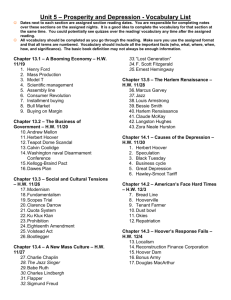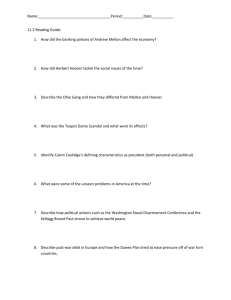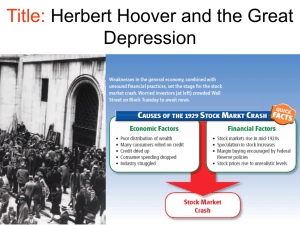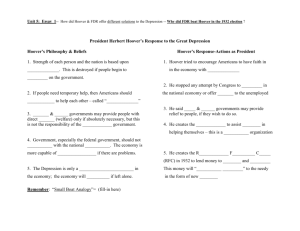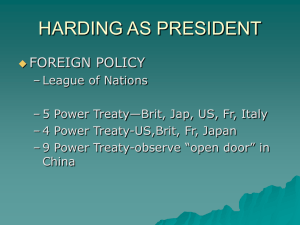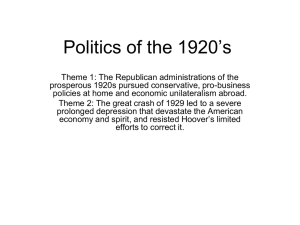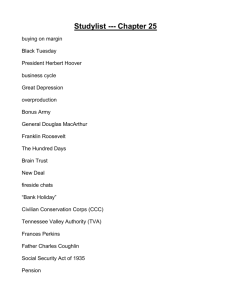The 1930s Introduction to the Depression
advertisement
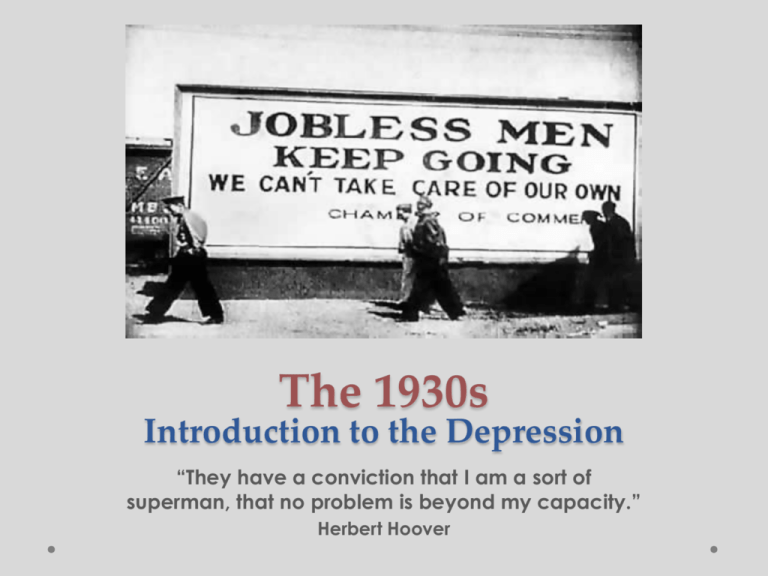
The 1930s Introduction to the Depression “They have a conviction that I am a sort of superman, that no problem is beyond my capacity.” Herbert Hoover Timeline of the 1930s 1914 to 1918 World War I 1918 to 1925 Reconstruction (by ’25 most economies of the world had returned to prewar levels.) 1925 to 1929 Prosperity 1929 to 1933 Plunge 1933 to 1937 Spotty Recovery (Recession hits in 1937) 1939 End of the Depression (Beginning of WWII) Question What are some events that caused the Depression? The Depression Five Reasons for the Depression 1. 2. 3. 4. 5. Farming Dilemmas Disparity in Income Collapse of Banks The Stock Market Crash of 19295 Presidents during the 1920s State of Industry? Not Good Superficial prosperity hid dilemmas in the economy. Basic industries failed: Textiles (Competition from Asia) Steel & Railroads (New forms of transportation) Homes (No one was building. Appliance sales fall) Cars (Became too expensive & poorly built) Causes One & Two 1. Farming Dilemmas 2. Disparity of Income Farmers had been suffering since WWI ended. Average male worker? Earned $4 a day. $1,200 a year. Loss of WWI contracts led to a surplus of food that had no buyers. No money? Cannot pay off debts and farms lost. A family of five required $2,000 to live in “health and decency” Causes Three & Four 3. Collapse of Banks People panicked and removed money. When banks hit $0 they close and take every account with them. In 1929 and 1930 banks were closing at a rate of two a day. 4. Stock Market Crash See Next Slide… The Stock Market Crashes US was at the top of production (34.4%) Up until 1928, the Stock Market was a true reflection of its worth. In 1928 alone, 567,990,875 stocks changed hands. So, what exactly happened? The market corrected itself. DOW Jones in December 1928? 245 points August 1929? 452 points November 1929? 224 points What do you mean? Numbers By 1933: Over 5,000 banks closed Industrial production fell by 50% 13m to 14m unemployed (roughly 25%) Sad Fact About the Depression “There were millions of tons of food around, but it was not profitable to transport it, to sell it. Warehouses were full of clothing, but people could not afford it. There were lots of houses, but they stayed empty because people couldn’t pay rent, had been evicted, and now lived in shacks in quickly formed “Hoovervilles” built on garbage dumps.” Howard Zinn A People’s History of The United States Buildup to Black Tuesday Review Presidents of the 1920s 1920 1924 1928 Warren G. Harding 1920 Presidential Election Harding & Coolidge Cox & Roosevelt “America's present need is not heroics but healing; not nostrums but normalcy; not revolution but restoration.” President Warren G. Harding Election of 1920 Warren G. Harding Harding’s Presidency? Harding had his own Depression after World War I lasting January 1920 to July 1921. GNP dropped 24% (91.5bn to 69.6bn) Unemployment rose to 12% (2.1m to 4.9m) How he handled it? “There will be depression after inflation, just as surely as the tides ebb and flow.” Largely unnoticed Presidency Kellogg-Briand Pact? Good idea. Fordney-McCumber Tariff? Bad idea. Died on August 2nd, 1923 Calvin Coolidge Coolidge’s Presidency? Awesome. After attending a show at the opera in which the main performance was fairly poor, President Coolidge was approached by a fellow member of the audience and asked: “What do you think of the singers execution, Mr. President?” Coolidge replied: “I am all for it.” Calvin Coolidge One more story… “Both his dry Yankee wit and his frugality with words became legendary. His wife, Grace Goodhue Coolidge, recounted that a young woman sitting next to Coolidge at a dinner party confided to him she had bet she could get at least three words of conversation from him. Without looking at her he quietly retorted: ‘You lose.’ And in 1928, while vacationing in the Black Hills of South Dakota, he issued the most famous of his laconic statements: ‘I do not choose to run for President in 1928.’” Calvin Coolidge WAIT. We also have… Rebecca the Raccoon Office Pranks NOW TO WHAT HE DID! Nothing. America boomed on its own and he believed in a laissez-faire system of economics. Background on Herbert Hoover “In six years, Hoover circled the globe five times. He lived through the Boxer Rebellion in China, hacked through the jungles of Borneo, rode camels across the red emptiness of Western Australia… camped beside the Great Pyramids of Egypt. He had experiences as rich and memorable as any young man has ever enjoyed, and was moved by none of them…. His life was work. There was nothing else.” Bill Bryson One Summer: America, 1927 Hoover was a self made man. By age 40 he had earned $4 million. ($55 million today) Hoover Prior to Becoming President? 1. Tasked with assisting Belgium following the destruction of the nation by Germany during World War I 2. Responsible for handling the relief effort following the Great Mississippi Flood of 1927 Background on Herbert Hoover Post-WWI Belgium Problem? Eight million Belgians in peril of starving following WWI. Hoover’s Solution? Hoover managed to find and distribute $1.8 million worth of food a week, every week, for two and a half years (2.5 million tons of it altogether) One of the greatest relief effort ever undertaken on earth. One enthusiast called him “the greatest humanitarian since Jesus Christ” Background on Herbert Hoover Great Mississippi Flood of 1927 What Happened? Heavy rainfall throughout the summer of 1926 into the fall and winter caused the river to swell (56.2ft of water in TN). Water flow (at some locations) was more than double that of the Niagara. Impacted: Illinois, Kentucky, Louisiana, Mississippi, Missouri, Tennessee, Texas, Oklahoma, Kansas, and Arkansas (14% covered by floodwater) Caused over $400m in damages and killed 246 people. Background on Herbert Hoover Great Mississippi Flood of 1927 “It is difficult to picture in words the might of the Mississippi in flood… To say that two blocks from where I stand it is at this minute flowing at a rate ten times that of Niagara seems unimpressive. Perhaps it becomes more impressive to say that at Vicksburg the flood is 6,000 feet wide and 50 feet deep, rushing on at the rate of 6 miles an hour. Behind this crest lies the ruin of 200,000 people.” Herbert Hoover Speech given in 1927 while in Mississippi The Great Mississippi Flood of 1927 What was Hoover told once the Mississippi had flooded? “A couple of thousand refugees are coming. They've got to have accommodations. Huts. Water mains. Sewers. Streets. Dining halls. Meals. Doctors. Everything. And you haven't got months to do it. You haven't got weeks. You've got hours.” Election of 1928 Herbert Hoover Hoover could handle problems, but why not during his presidency? “If some unprecedented calamity should come upon this nation, I would be sacrificed to the unreasoning disappointment of a people who had expected too much.” Herbert Hoover (1929) Herbert Hoover So, why was the 1930s the downfall of President Hoover despite being called “Wonder Boy” by President Coolidge? FIND OUT! Using Chapter 22.2 and 22.3 complete the following handouts and find out what Herbert Hoover did (or did not do) to help the nation through the Depression.
